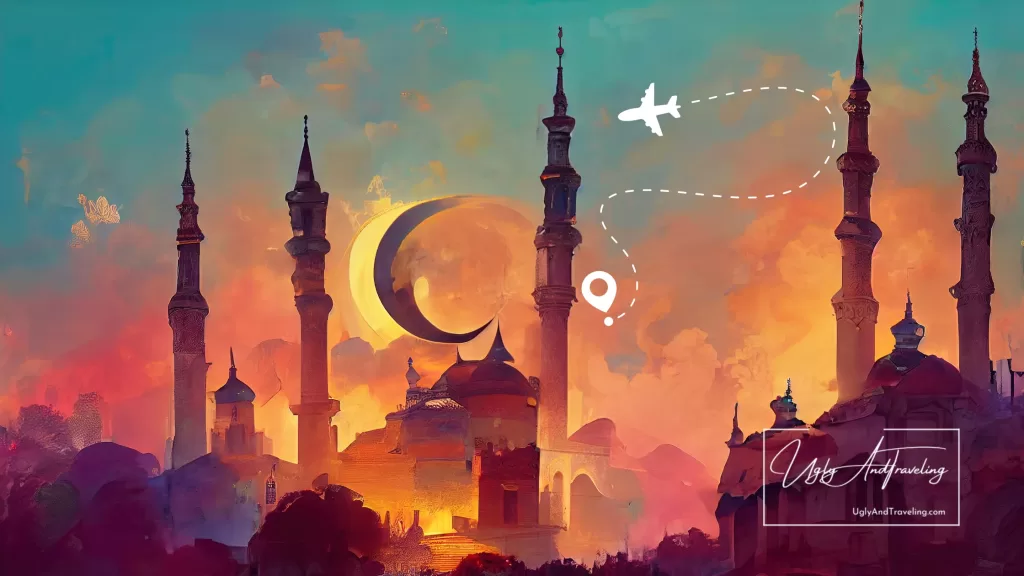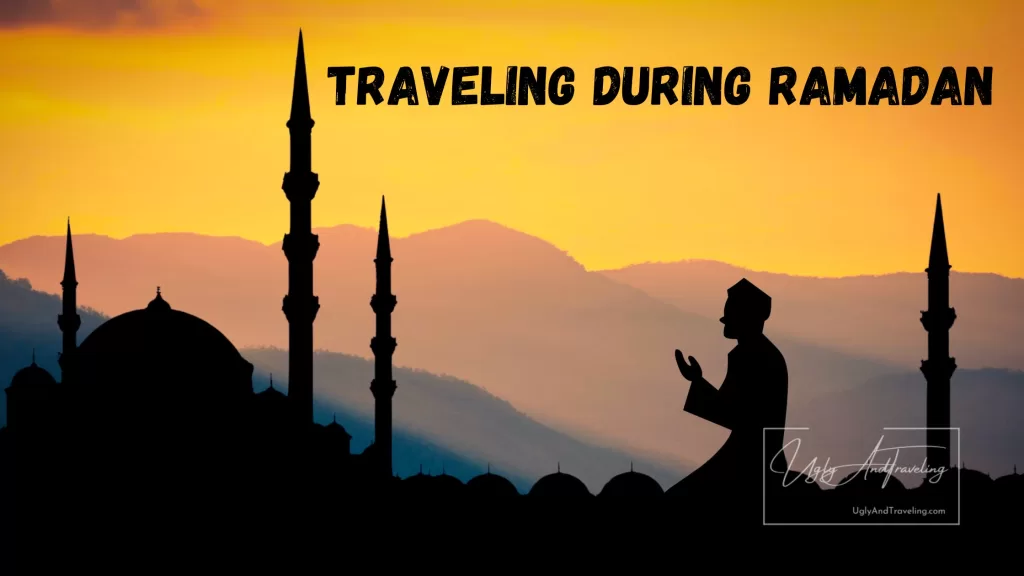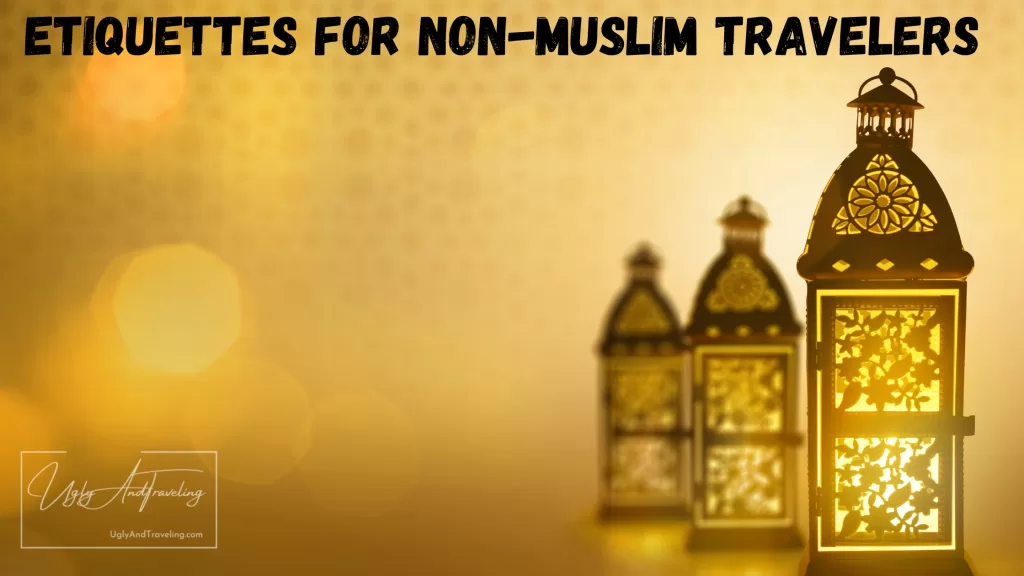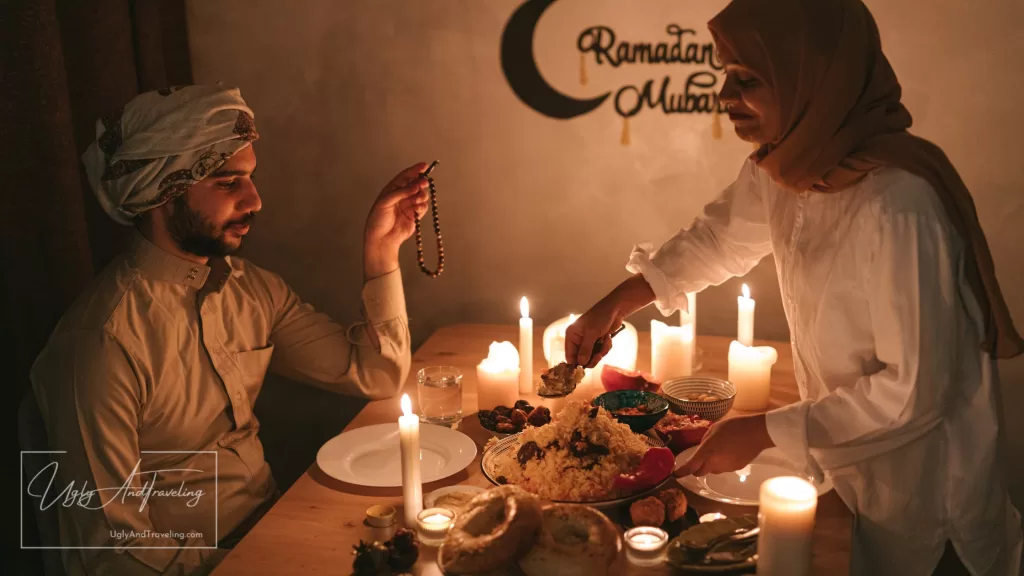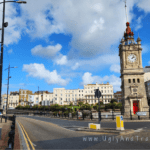Traveling during Ramadan can be a fantastic opportunity to experience different cultures and traditions, all while observing the holy month. But, it’s no walk in the park. Juggling fasting, prayers, and sightseeing can be quite the challenge.
As we all know traveling during Ramadan can be a challenging yet rewarding experience. Whether you’re a Muslim or non-Muslim traveler, it’s essential to plan ahead, be respectful of the local customs and traditions, and maintain your religious obligations. By following the tips and etiquettes outlined in this article, you can make the most of your journey while showing respect for the local culture.
Fret not! We’re here to help you make the most of your unforgettable and meaningful journey with our top tips for traveling during Ramadan.
Traveling During Ramadan
Ramadan is a holy month in the Islamic calendar when Muslims worldwide fast from sunrise to sunset. It is also a time when families come together, reflect on their spirituality, and celebrate their faith. For those who travel during Ramadan, it can be a challenging experience as they navigate unfamiliar territories and try to maintain their religious obligations.
What is Ramadan?
Before we dive into the topic of traveling during Ramadan, it’s essential to understand what Ramadan is and what it means for Muslims. Ramadan is the ninth month in the Islamic calendar and is observed by Muslims worldwide.
It is a time of spiritual reflection, self-improvement, and increased devotion and worship. Muslims fast from sunrise to sunset during Ramadan and refrain from eating, drinking, smoking, and engaging in sexual activities during this time. The goal of fasting is to increase one’s piety and gain a deeper understanding of one’s faith.
Plan Ahead
If you’re planning to travel during Ramadan, it’s crucial to plan ahead to ensure that your travel arrangements do not conflict with your religious obligations. Consider the length of your trip, the time of day you will be traveling, and the destination’s local customs and traditions.
Traveling During Ramadan: Tips for an Unforgettable and Meaningful Journey starts with planning your itinerary wisely. Remember to:
- Allow time for daily prayers and breaking fast
- Schedule sightseeing during the cooler hours of the day
- Consider the impact of shorter business hours on your plans
- Avoid overcrowded tourist spots, as they can be overwhelming while fasting
Check the dates of Ramadan
Ramadan dates change every year, based on the lunar calendar. It’s essential to check the dates of Ramadan and plan your travel accordingly. Ramadan lasts for 29 or 30 days, depending on the sighting of the new moon.
Choose your destination wisely
If you’re traveling to a Muslim-majority country during Ramadan, you’ll notice significant changes in the local customs and traditions. It’s crucial to choose your destination wisely and understand the local customs and traditions to avoid any unintentional cultural misunderstandings.
Book your accommodations in advance
During Ramadan, hotel bookings can be challenging due to the increased demand. It’s recommended to book your accommodations in advance to avoid any last-minute hassle.
Traveling while Fasting
If you’re a Muslim traveler, traveling while fasting can be a challenging experience. Here are some tips to help you make the most of your journey while maintaining your religious obligations.
Break your fast with dates and water
Breaking your fast with dates and water is a sunnah of Prophet Muhammad (peace be upon him) and is an excellent way to break your fast while traveling. Dates are high in sugar, providing quick energy after a long day of fasting.
Pack some snacks
When traveling, it’s important to have some snacks with you to avoid getting too hungry. Pack some energy bars, nuts, and fruits in your bag to keep yourself nourished during the journey.
Stay Nourished and Hydrated
Fasting during Ramadan while traveling can be tough, but proper preparation can make all the difference. Here are some tips to help you stay nourished and hydrated:
- Stock up on nutritious, non-perishable snacks for suhoor (pre-dawn meal)
- Hydrate well before fasting, focusing on water and avoiding caffeinated or sugary beverages
- Choose high-fiber, slow-digesting foods for suhoor to keep you fuller for longer
- Break your fast with a balanced iftar meal, incorporating proteins, healthy fats, and complex carbohydrates
Embrace Local Traditions
Immersing yourself in the local culture is key to a memorable experience. During Ramadan, this means:
- Participating in iftar dinners with locals
- Visiting mosques for prayers and spiritual reflection
- Attending community events, such as lectures or charity drives
- Observing cultural etiquette, such as dressing modestly and refraining from public eating
Research Accommodations and Transportation
Having the right accommodations and transportation can make your journey smoother. Keep these pointers in mind:
- Choose accommodations that cater to fasting travelers, such as hotels offering suhoor and iftar meals
- Opt for public transport during off-peak hours to avoid overcrowding and reduce travel time
- Consider renting a car for flexibility and the ability to create a tailored travel experience
Stay Mindful and Respectful
Lastly, don’t forget the true essence of Ramadan – empathy, reflection, and self-improvement. Make your journey unforgettable and meaningful by:
- Engaging in acts of kindness, charity, and community service
- Reflecting on your spiritual journey and setting intentions for personal growth
- Practicing patience and understanding with fellow travelers and locals
Make up missed fasts later
If you miss a fast while traveling, you can make it up later. Allah (SWT) has given this concession to those who are traveling and find it difficult to fast.
Etiquettes for Non-Muslim Travelers
If you’re a non-Muslim traveler, traveling during Ramadan requires some extra considerations to respect the local customs and traditions.
Dress modestly
It’s important to dress modestly while traveling during Ramadan. Avoid wearing revealing clothing, shorts, and tank tops. Cover your knees and shoulders to show respect for the local customs and traditions.
Avoid eating and drinking in public
If you’re a non-Muslim traveler, avoid eating and drinking in public during the fasting hours. Muslims are observing their religious obligations, and it’s crucial to show respect for their faith.
Be mindful of your behavior
During Ramadan, Muslims are expected to show increased piety and devotion to their faith. It’s essential to be mindful of your behavior and show respect for the local customs and traditions. Avoid loud music, excessive partying, and public displays of affection, as they may be considered inappropriate during Ramadan.
Respect prayer times
Prayer times are significant during Ramadan, and it’s crucial to show respect for them. If you’re in a Muslim-majority country, avoid scheduling any activities during prayer times, and be respectful of those who are praying.
Learn about Ramadan
Take the time to learn about Ramadan and its significance for Muslims. This will help you gain a better understanding of the local customs and traditions and show respect for them.
A frequently asked questions
Q: Can I still travel to Muslim-majority countries during Ramadan?
A: Absolutely! Traveling during Ramadan can offer a unique cultural experience. However, it’s essential to be respectful of local customs and traditions while observing the fasting month.
Q: Is it appropriate to travel during Ramadan as a non-Muslim?
Yes, it’s appropriate to travel during Ramadan as a non-Muslim. However, it’s important to be respectful of the local customs and traditions.
Q: Can I eat and drink during Ramadan as a non-Muslim traveler?
Yes, you can eat and drink during Ramadan as a non-Muslim traveler. However, it’s recommended to do so in private or designated areas.
Q: Can I visit mosques during Ramadan?
Yes, you can visit mosques during Ramadan. However, it’s important to dress modestly and show respect for prayer times.
Q: Do airlines provide food during Ramadan?
Some airlines provide food during Ramadan, while others do not. It’s recommended to check with your airline beforehand.
Q: Can I make up missed fasts after Ramadan?
Yes, you can make up missed fasts after Ramadan. Muslims are given this concession by Allah (SWT) to accommodate their travel and other circumstances.
Q: How can I find restaurants open during the day in Ramadan?
A: While many eateries may be closed during fasting hours, some establishments cater to non-fasting customers. Researching in advance, asking locals, or using travel forums can help you locate open restaurants.
Q: What should I wear when traveling during Ramadan?
A: It’s best to dress modestly, covering your shoulders and legs, especially when visiting religious sites. Both men and women should avoid revealing or tight-fitting clothing to respect local customs.
Q: Can I drink water in public during Ramadan?
A: In some countries, it may be frowned upon to eat or drink in public during fasting hours. To be respectful, try to consume water or snacks discreetly, or find a private space to do so.
Q: Is it possible to find hotels that serve suhoor and iftar meals during Ramadan?
A: Yes, many hotels in Muslim-majority countries cater to fasting guests by providing suhoor and iftar meals. Researching and booking accommodations that offer these services in advance can make your stay more convenient and enjoyable.
Q: How can I manage my energy levels while fasting and sightseeing during Ramadan?
A: To maintain your energy levels, prioritize rest, and avoid overexertion. Plan your sightseeing during the cooler hours of the day, take breaks as needed, and ensure you’re eating nourishing suhoor and iftar meals.
Q: Can non-Muslim travelers also participate in iftar dinners or other Ramadan activities?
A: Absolutely! Non-Muslim travelers are often welcome to join iftar dinners or attend community events, as it’s an excellent opportunity to learn about local culture and traditions. Just be sure to follow local customs and etiquette during these events.
Q: What should I expect in terms of business hours during Ramadan?
A: During Ramadan, business hours may be reduced, and some establishments may close during the day. It’s essential to research and plan your activities accordingly. Keep in mind that some businesses may also extend their hours after iftar.
Q: How can I be respectful of those fasting while I am not observing Ramadan?
A: To show respect for those fasting, avoid eating, drinking, or smoking in public during fasting hours. Dress modestly and be mindful of local customs and traditions. Additionally, displaying patience, empathy, and understanding.
Q: What are the best destinations for traveling during Ramadan while still enjoying a rich cultural experience?
A: Some popular destinations for a memorable and meaningful journey during Ramadan include Istanbul, Marrakech, Dubai, and Kuala Lumpur. These cities offer a unique blend of history, culture, and modern amenities while providing an immersive Ramadan experience.
Q: Are there any specific travel tips for female travelers during Ramadan?
A: Female travelers should dress modestly, covering their shoulders, legs, and chest area. It’s also advisable to carry a lightweight scarf for visiting mosques or other religious sites. Be mindful of local customs, and consider joining group tours or connecting with other female travelers for added safety and camaraderie.
Q: How can I find Ramadan events and activities while traveling?
A: Researching local events, connecting with local communities, and seeking recommendations from hotel staff or other travelers can help you discover unique Ramadan events and activities. Social media platforms and travel forums are also valuable resources for finding up-to-date information.
Q: Can I still enjoy the local cuisine during Ramadan if I am not fasting?
A: Definitely! Although many restaurants may close or operate with reduced hours during fasting hours, you can still find eateries serving local cuisine. Iftar dinners, in particular, provide an excellent opportunity to sample a variety of traditional dishes while experiencing the breaking of the fast with locals.
Q: How can I ensure a smooth travel experience during Ramadan without disrupting my fasting and prayer routine?
A: Plan your itinerary around prayer times, allowing for adequate rest and spiritual reflection. Choose accommodations that cater to fasting guests and provide prayer facilities. Additionally, carry a prayer timetable and compass to help determine the direction of prayer (Qibla) when you’re on the go. Familiarize yourself with local mosques and their schedules to make it easier to participate in congregational prayers while traveling.
Q: Are there any specific packing tips for travelers observing Ramadan?
A: When packing for a trip during Ramadan, consider including the following items:
- Lightweight, modest clothing that provides coverage and keeps you cool
- A prayer mat and compass to help with prayers on the go
- Non-perishable, nutritious snacks for suhoor and iftar
- A reusable water bottle to stay hydrated when breaking your fast
- A travel-sized Quran or prayer book for spiritual reflection
Q: Can I volunteer or participate in charity activities while traveling during Ramadan?
A: Yes! Volunteering and participating in charitable activities during Ramadan can enhance your travel experience and align with the spirit of the holy month. Reach out to local mosques, community centers, or charitable organizations to inquire about opportunities for volunteering or donating to those in need.
Q: How can I manage jet lag while fasting during Ramadan?
A: To minimize the impact of jet lag on your fasting routine, try to adjust your sleep schedule gradually before your trip. Stay well-hydrated before and after your flight, and allow yourself time to rest and acclimate to the new time zone. Consult with a religious authority regarding fasting adjustments if you’re crossing multiple time zones, as the duration of fasting hours may vary significantly.
Q: Is it safe to travel to certain countries during Ramadan, considering the heightened security measures in some places?
A: While security measures may be heightened in some countries during Ramadan, it’s generally safe to travel, provided you stay informed about the local situation and follow any travel advisories issued by your government. Exercise caution, be aware of your surroundings, and follow local customs and etiquette to minimize any risks.
Q: How can I maintain my fitness routine while fasting and traveling during Ramadan?
A: To maintain your fitness routine during Ramadan, consider:
- Engaging in light exercises such as walking, stretching, or yoga, preferably during the early morning or evening hours
- Scheduling workouts after iftar to ensure you have enough energy and hydration
- Adjusting your workout intensity and duration to prevent overexertion
- Prioritizing rest and recovery to avoid physical exhaustion
Remember, it’s essential to listen to your body and adjust your fitness routine as needed to prioritize your health and well-being during the holy month.
My Final Thoughts
Traveling during Ramadan offers a one-of-a-kind experience that allows you to immerse yourself in the true spirit of the holy month.
By planning your itinerary wisely, embracing local traditions, staying nourished and hydrated, researching accommodations and transportation, and practicing mindfulness and respect, you’ll be well on your way to an unforgettable and meaningful journey.
Keep our tips in mind, and you’ll be sure to make the most of your travels during this special time.
If you found this blog helpful, It would be great if you could share it with your family and friends who might find it useful as well. Also you can join our traveler community and meet other travel lovers, share tips and travel experiences with each other.
Please subscribe to my YouTube channel “Ugly And Traveling” and watch 4K travel vlogs.
Stay safe and much love!
Traveling with the green 💚 passport
Take only memories✈️leave only footprints.
